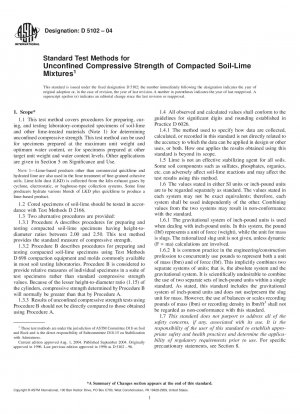ASTM D5102-04
Standard Test Method for Unconfined Compressive Strength of Compacted Soil-Lime Mixtures
- Standard No.
- ASTM D5102-04
- Release Date
- 2004
- Published By
- American Society for Testing and Materials (ASTM)
- Status
- Replace By
- ASTM D5102-09
- Latest
- ASTM D5102/D5102M-24
- Scope
Compression testing of soil-lime specimens is performed to determine unconfined compressive strength of the cured soil-lime-water mixture to determine the suitability of the mixture for uses such as in pavement bases and subbases, stabilized subgrades, and structural fills.
Compressive strength data are used in soil-lime mix design procedures: (a) to determine if a soil will achieve a significant strength increase with the addition of lime; (b) to group soil-lime mixtures into strength classes; (c) to study the effects of variables such as lime percentage, unit weight, water content, curing time, curing temperature, etc.; and (d) to estimate other engineering properties of soil-lime mixtures.
Lime is generally classified as calcitic or dolomitic. Usually in soil stabilization, high-calcium hydrated lime [Ca(OH)2] or monohydrated dolomitic lime [Ca(OH)2 + MgO] are used. Lime may increase the strength of cohesive soil. The type of lime in combination with soil type influences the resulting compressive strength.
Note 28212;The agency performing this test method can be evaluated in accordance with Practice D 3740
. Not withstanding statements on precision and bias contained in this method: The precision of this test method is dependent on the competence of the personnel performing it and the suitability of the equipment and facility used. Agencies that meet the criteria of Practice D 3740 are generally considered capable of competent and objective testing. Users of this test method are cautioned that compliance with Practice D 3740 does not, in itself, ensure reliable testing. Reliable testing depends on many factors; Practice D 3740 provides a means of evaluating some of these factors. 1.1 This test method covers procedures for preparing, curing, and testing laboratory-compacted specimens of soil-lime and other lime-treated materials (Note 0) for determining unconfined compressive strength. This test method can be used for specimens prepared at the maximum unit weight and optimum water content, or for specimens prepared at other target unit weight and water content levels. Other applications are given in Section on Significance and Use.
Note 18212;Lime-based products other than commercial quicklime and hydrated lime are also used in the lime treatment of fine-grained cohesive soils. Lime kiln dust (LKD) is collected from the kiln exhaust gases by cyclone, electrostatic, or baghouse-type collection systems. Some lime producers hydrate various blends of LKD plus quicklime to produce a lime-based product.
1.2 Cored specimens of soil-lime should be tested in accordance with Test Methods D 2166.
1.3 Two alternative procedures are provided:
1.3.1 Procedure A describes procedures for preparing and testing compacted soil-lime specimens having height-to-diameter ratios between 2.00 and 2.50. This test method provides the standard measure of compressive strength.
1.3.2 Procedure B describes procedures for preparing and testing compacted soil-lime specimens using Test Methods D 698 compaction equipment and molds commonly available in most soil testing laboratories. Procedure B is considered to provide relative measures of individual specimens in a suite of test specimens rather than standard compressive strength values. Because of the lesser height-to-diameter ratio (1.15) of the cylinders, compressive strength determined by Procedure B will normally be greater than that by Procedure A.
1.3.3 Results of unconfined compressive strength tests using Procedure B should not be directly compared to those obtained using Procedure A.
1.4 All observed and calculated va......
ASTM D5102-04 Referenced Document
- ASTM C51 Standard Terminology Relating to Lime and Limestone (as Used by the Industry)
- ASTM C977 Standard Specification for Quicklime and Hydrated Lime for Soil Stabilization
- ASTM D2166 Standard Test Method for Unconfined Compressive Strength of Cohesive Soil*, 2024-04-19 Update
- ASTM D2216 Standard Test Method for Laboratory Determination of Water (Moisture) Content of Soil and Rock by Mass
- ASTM D2488 Recommended Practice for Description Of Soils (Visual-Manual Procedure)
- ASTM D3551 Standard Practice for Laboratory Preparation of Soil-Lime Mixtures Using a Mechanical Mixer
- ASTM D3740 Standard Practice for Minimum Requirements for Agencies Engaged in the Testing and/or Inspection of Soil and Rock as Used in Engineering Design and Construction
- ASTM D4753 Standard Specification for Evaluating, Selecting, and Specifying Balances and Scales for Use in Soil, Rock, and Construction Materials Testing
- ASTM D6026 Standard Practice for Using Significant Digits in Geotechnical Data
- ASTM D653 Standard Terminology Relating to Soil, Rock, and Contained Fluids
- ASTM D698 Standard Test Methods for Laboratory Compaction Characteristics of Soil Using Standard Effort (12 400 ft-lbf/ft3 (600 kN-m/m3))*, 2024-04-19 Update
ASTM D5102-04 history
- 2024 ASTM D5102/D5102M-24 Standard Test Methods for Unconfined Compressive Strength of Compacted Soil-Lime Mixtures
- 2022 ASTM D5102/D5102M-22 Standard Test Methods for Unconfined Compressive Strength of Compacted Soil-Lime Mixtures
- 2009 ASTM D5102-09 Standard Test Method for Unconfined Compressive Strength of Compacted Soil-Lime Mixtures
- 2004 ASTM D5102-04 Standard Test Method for Unconfined Compressive Strength of Compacted Soil-Lime Mixtures
- 1996 ASTM D5102-96 Standard Test Method for Unconfined Compressive Strength of Compacted Soil-Lime Mixtures
